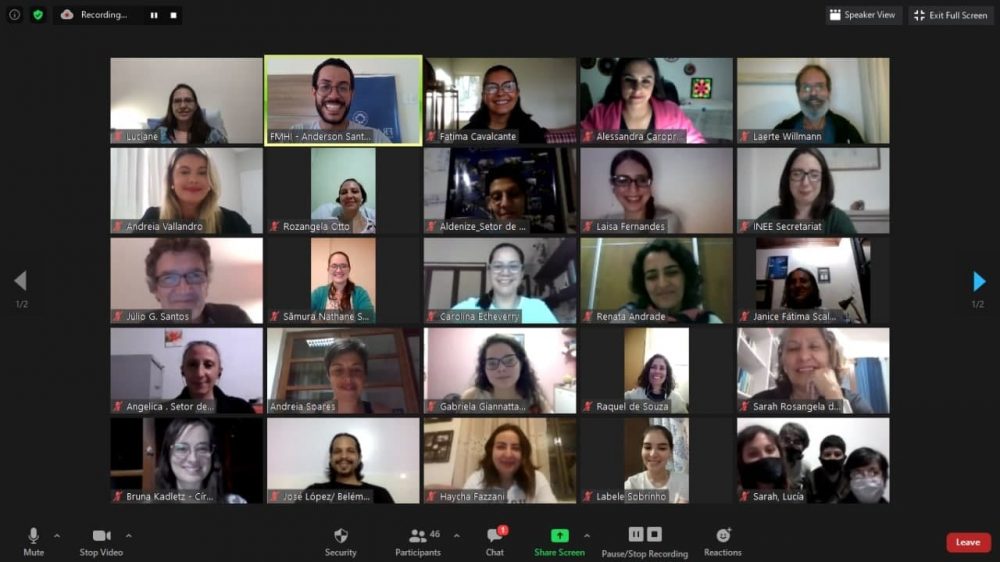Humanitarian Actors in Brazil Participate in Training About the Minimum Standards for Education (MSE)
To guarantee that all people affected by emergency situations have access to quality education; that is the mission of the Inter-agency Network for Education in Emergencies (INEE), which is active all over the world. To guide the quality of the responses in crisis situations, conflicts, or catastrophes, INEE, with the participation of agencies, organizations and institutions from various countries, has put together the Handbook Minimum Standards for Education (MSE).

Striving to expand the reach of the proposals of the Handbook, the INEE Network, the Fraternity – International Humanitarian Missions (FIHM), affiliated with the Fraternity – International Humanitarian Federation (FIHF), unprecedently promoted the training on the Minimum Standards for Education to humanitarian actors in Brazil.
“The objective of the training was to provide knowledge of, and explore and adapt the Minimum Standards for Education within various contexts,” explains the coordinator of the training, Anderson Santiago, who is a member of the Management Committee of the Humanitarian Fraternity (FIHF) and focal point of the INEEin Brazil.
Of the 94 registrants, 36 were selected for an online immersion through the Zoom platform, with the use of participative tools during April 23, 24, 26 and 27. In the training content were activities that included going deeper into the MSE with case studies. At the end, a concluding activity was reviewed, where the participants will be able to reflect on the use of the Minimum Standards within the context of their humanitarian work.
Anderson considers the Training to be a framework of the discussion in Brazil on Education in Emergencies: ”Because we have participants from various states and organizations, the sharing of the experiences, the points of view, and the different contexts enriched the basic content of the Minimum Standards for Education in Emergenecies.” Concerning the participation of the group, he highlights the engagement in the group discussions and emphasizes that, for the team of facilitators, it was a challenge that will probably open up new opportunities.
The training team was made up of six missionaries of the Humanitarian Fraternity (FIHF) from Brazil; and from Portugal, the INEE representative of the Portuguese Language Community, Andreia Soares, was joined by the professor Júlio Gonçalves dos Santos, of the Porto University, who has been active in education in emergencies for more than 20 years.
The word is with the participants in the training
Among the participants there was Marcela Possato, from Florianópolis (SC), volunteer for the ONG Hospitality Circles, a movement for the humanization of welcome to refugee and immigrant people, headquartered in that city. Marcela tells us that, “The training was very valid for helping to understand how to structure, and what the requirements are for, acting in education in emergencies. With the presentation of real situations, it was possible to observe how the plans should be carried out, and mainly, to realize the importance of community participation in all the stages of the process. Besides that, the group discussions made an exchange of knowledge possible, which each participant brought with them, making the discussions even richer.”
Marcela is a Masters student in the post-graduate program on nursing of the Federal University of Santa Catarina. Her research project seeks to understand how the routines and rituals of health improvements occur in Venezuelan families that participate in the interiorization strategy.
This is her second training through the Humanitarian Fraternity (FIHF). In 2020, Marcela participated in the training on the Introduction to the Sphere Handbook, when she was better able to understand how the humanitarian work was organized, and its basic principles.
Another participant was Regislany Morais, humanitarian worker and researcher in the area of Humanitarian Evaluation, Participation and Action, from Fortaleza (CE). She comments that the MSE training has a structure very relevant to the professional career of a humanitarian worker. “It has key elements for understanding humanitarian actions and leads to an approach to the minimum standards for emergency education in a dialogical and constructive way,” she highlights.
As to the training structure, she highlights, “It was well organized, so that the participant could reflect on the application of the requirements in their practice while exploring the use of the Handbook, and this is due to the way in which it was organized, to the study of cases, and the importance given to the sharing of knowledge and experiences of the participants and facilitators. Its content places the participation of the people affected by humanitarian crises at the center of all reflection. It was a very rich learning process.”
From Portugal, a relevant contribution
The training had the important contribution of professor Júlio Gonçalves dos Santos, from The University of Porto, who acted as co-trainer on two occasions: first, on the foundations of education in emergencies, and second, on the application of the standards to various crisis scenarios, concluding this part with a reflection on coherence in the Humanitarian Action and Development Nexus.
He highlights the engagement and interest of the participants. “I believe they will continue to go deeper in this area, which in the times of the Covid-19 pandemic, is of growing relevance in a search for effective and quality educational responses. I participated in extremely interesting discussions on the potential of using the MSE in a Brazilian context, which highlighted the need for more investment in training and research.”
In conclusion, he emphasizes, “In the ambience of the relationship between the MSE and a response to the Covid-19, the MSE’s have been considered a stabilizing force at a global level in times of crisis. If we read the MSE Manual carefully, its basic principles and guidelines – protection, security and a sense of belonging, equity, communication and transparency, human dignity – can be applied in any time of disruption and uncertainty.”





